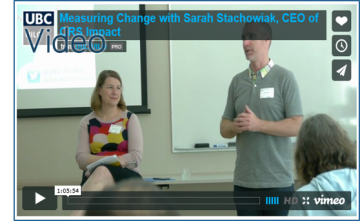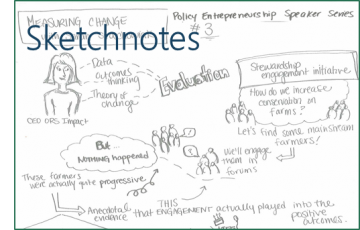Speaker Series #3: Sarah Stachowiak
How do you capture the long term impact that your work will create? Meaningful grant writing and reporting begins with keeping your outcomes in mind.
In this final session, speaker Sarah Stachowiak, CEO of ORS Impact, focused on the challenge of time horizons, i.e. how do you address the discrepancies between the potential impacts of your research, often long-term oriented, and the short time frames that your project grants are designed to accommodate?
Sarah will help you integrate policy change and influence into your grant applications and reporting. By answering some deceptively simple questions Why you do what you do? And how will it make a difference?, you can capture important information that gets to the heart of your Theory of Change, the discipline of mapping how activities link to strategies, to outcomes, and to your vision of a world made better by your work. We will discuss examples and case studies where this kind of policy and change evaluation is done really well, as well as examples where it went off the rails.
Guest Speaker: Sarah Stachowiak, CEO of ORS Impact
Sarah Stachowiak is nationally-recognized as a thought leader in advocacy evaluation. She has worked to measure and evaluate advocacy and policy efforts from issues ranging from early childhood, the environment and health equity issues with clients ranging from large family foundations (including the Bill & Melinda Gates Foundation, the David & Lucile Packard Foundation, and William and Flora Hewlett Foundation) to non-profits supporting grassroots organizing efforts. Sarah was one of the authors on the Guide to Evaluating Advocacy and Policy and lead author on Pathways for Change: 10 Theories to Inform Advocacy and Policy Change Efforts. She received her Master’s in Public Administration from the University of Washington’s Evans School of Public Affairs.




